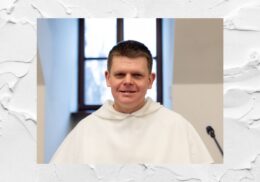I am not sure I would be Catholic today without two hoary old priests, now dead.
Both of these priests spent almost all their days in the unspectacular American state of Wisconsin. Both doggedly transmitted the faith to crowds of people — old and young, grateful and callously unreceptive — for years and years.
Transmitting the faith: the Bible is not a cookbook that can be followed step-by-step to make a cake called Faith. Faith must be transmitted mouth to mouth and hand to hand, like a winter cold.
That’s why we need teachers. That’s why we need good priests.
The only things I know about these priests I remember from late childhood. Like most priests, they served us and we knew them not. Or not entirely. But let me draw for you, from memory, portraits of these two priests that marked my imagination. I have not seen either of them in 25 years.
Let’s start with Father Cletus Healy, a Jesuit. Father Healy died in 2014 at the age of 96: that means he was born just as the First World War ended. War, moral and political and military, shaped Father Healy. He was a particularly good hater of Communism and preached tirelessly against it. He opened a home-baked bookstore and filled it with anti-Marxist tracts, some of his own manufacture. There were also a lot of plaster statues.
When I was a young teenager, some family in our circle organized a series of evening lectures with Father Healy. I remember sitting in an overheated ultra-bourgeois living room listening to him intone English in an inimitable Midwestern drawl. He let words roll around the back of his throat and over the sides of his tongue, like cognac. And he liked nothing more than to talk about, and condemn, the Saaah-viet Union. He talked of impoverished Central European subjects forced to applaud as the May Day parade chugged by. He evoked the image of a farmer tilling a field with a dull plow just because some blind commissar had so ordered. Round and round on a red tractor, the blunt blades scraping the earth ineffectually – it’s an image I still remember.
Healy commanded silence in that parlor. As he spoke, all you could hear was the clicking of the pretentious antique clock. He was witheringly serious, but he was never proud. He was slowly, carefully preparing the troops for battle. The extremes of 20th-century history were always with us in the room. What would we 14- and 15-year-olds do when the midnight knock came at our door? When the cadre or the storm trooper held a gun to our heads? Would we deny our God?
The clock banged out a chime in some turgid Victorian tune and we pictured bloody Catholics slumped against a concrete wall, perforated by the bullets of an Atheist firing line.
From Father Healy, we learned that faith is a matter of life and death.
For all the gloom, his adolescent students loved him, and even coined a song about him based on a stupid campfire ditty called Father Abraham Had Many Sons: “Father Healy had many sons…” we intoned, flailing our limbs in unison. I think Healy secretly liked it.
In a certain spiritual sense, the song was prophetic.
…
And then there is Monsignor Emmenegger. Born in 1917 in Monroe, a Swiss emigrant hamlet in southern Wisconsin known for its ersatz Emmental cheese, he died in 2000.
Monsignor (never “Father”) Emmenegger was a figure of awe for every child at Saint Mary’s School, which I began attending as a ten-year-old. He was the pastor, of course. He wore a black cassock with red piping. Most exotic: cassocks were as rare as hoop-skirts in Milwaukee in the 1990s.
The man had a reputation for intellectual seriousness. People whispered that he had been at Vatican II as a young priest in some auxiliary role; that he was unjustly passed over to be our bishop – and, they would add in a quieter whisper, he would have been a far better bishop than the one we did get.
Intellectual though he might have been, Monsignor Emmenegger himself came every few weeks to teach catechism to the kids in the school. I liked to sketch maps of his craggy face in the margins of the notebook I had marked with the label RELIGION. In teaching Church History, he never spoke of “the Reformation” — only “the so-called Reformation.” Even in the eighth grade, that caused a frisson.
In February, it was the Monsignor who cleared the sidewalks to the church, slicing with the blade of an inverted shovel through a crispy crust of ice-snow that cracked as you walked as if you were treading on top of a strudel. In summer, he trimmed the lawn around the church, wearing an undershirt. When parishioners (like my parents) approached, he turned off the motor on the mower to chat.
There is a story by which his former sheep remember their shepherd: Emmenegger was punctual. He heard confessions every Friday from 4 to 6 in the afternoon. When there was a long line after six, he stepped out of the box and announced: “Confessions at this parish are from 4 to 6. It is now 6:15. Anyone with a mortal sin on his soul is welcome to stay. Everyone else come back next week.”
Penitents scattered like chickens under a hawk.
Monsignor Emmenegger, kind and hard, aloof and always there, was a hero to some. He trained all of us boys as altar servers — and glared at any subsequent missteps. When a former friend of mine, another boy in that class, was ordained a priest at the parish several years after the Monsignor’s death, his mother found the old man’s chalice in an ecclesial warehouse in Chicago. That chalice, dusted off and shining briskly, is on the altar still.
…
In a pathologically frivolous time; in a world more light-headed now than it was even in the 90s, I think back on Father Healy and Monsignor Emmenegger.
I will be a priest soon (if someone decides to let me).
If these veteran soldiers, smelling of the censer and tobacco, could stand at the altar as great empires and ancient rites and fellow priests collapsed around them — if they could transmit the faith through a rotten century — there may be hope for me and my fellows yet.
We just might get through…
As long as we serve and do not complain. As long as we never forget who we are by virtue of our ordination. And as long as we keep a sense of humor.












Dziękuję za te piękne głębokie opowieści z Ameryki jakiej nie znam. Powodzenia, odwagi i wytrwania!!! hm.. z Tymi kapłanami spotkamy się kiedyś w niebie… i opowiem, że czytałam o nich na Polskim blogu 🙂